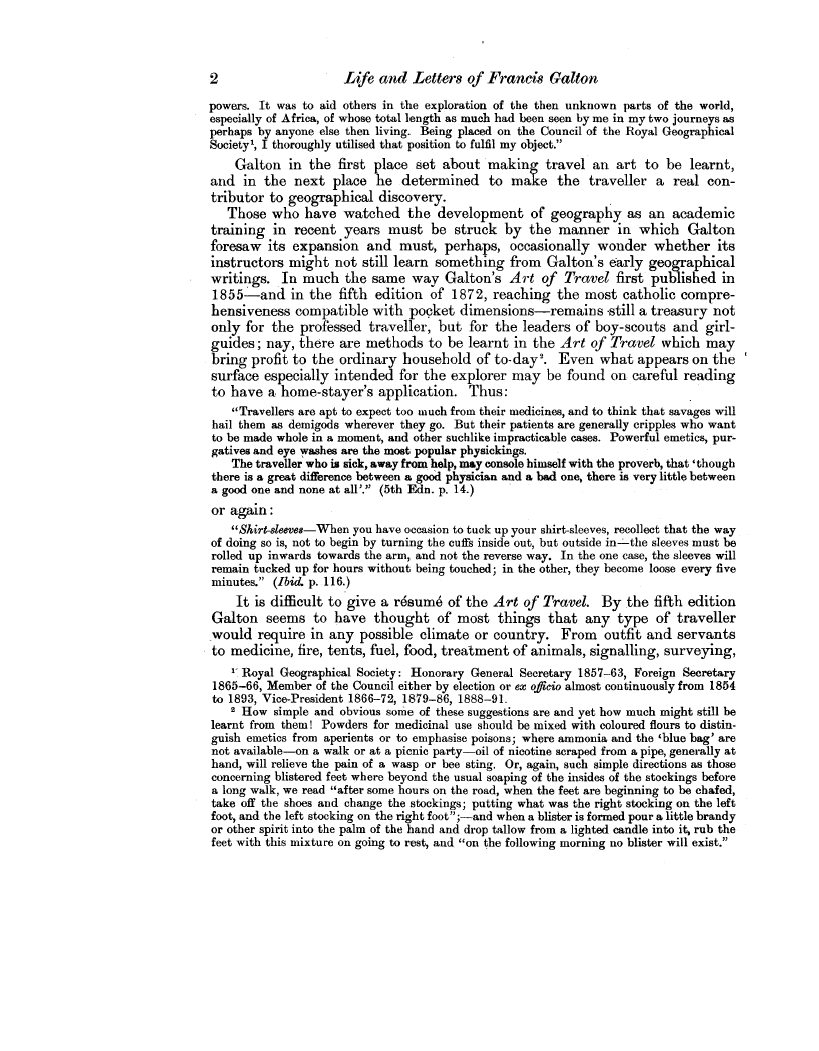2 Life and Letters of Francis Galton
powers. It was to aid others in the exploration of the then unknown parts of the world, especially of Africa, of whose total length as much had been seen by me in my two journeys as perhaps by anyone else then living. Being placed on the Council of the Royal Geographical Society', I thoroughly utilised that position to fulfil my object."
Galton in the first place set about makin travel an art to be learnt, and in the next place he determined to make the traveller a real contributor to geographical discovery.
Those who have watched the development of geography as an academic training in recent years must be struck by the manner in which Galton foresaw its expansion and must, perhaps, occasionally wonder whether its instructors might not still learn something from Galton's early geographical writings. In much the same way Galton's Art of Travel first published in 1855-and in the fifth edition of 1872, reaching the most catholic comprehensiveness compatible with pocket dimensions-remains still a treasury not only for the professed traveller, but for the leaders of boy-scouts and girlguides nay, there are methods to be learnt in the Art of Travel which may bring profit to the ordinary household of to-day2. Even what appears on the surface especially intended for the explorer may be found on careful reading to have a home-stayer's application. Thus:
"Travellers are apt to expect too much from their medicines, and to think that savages will hail them as demigods wherever they go. But their patients are generally cripples who want to be made whole in a moment, and other suchlike impracticable cases. Powerful emetics, purgatives and eye washes are the most popular physickings.
The traveller who is sick, away from help, may console himself with the proverb, that 'though there is a great difference between a good physician and a bad one, there is very little between a good one and none at all'." (5th Edn. p. 14.)
or again
"Shirt-sleeves-When you have occasion to tuck up your shirt-sleeves, recollect that the way of doing so is, not to begin by turning the cuffs inside out, but outside in-the sleeves must be rolled up inwards towards the arm, and not the reverse way. In the one case, the sleeves will remain tucked up for hours without being touched; in the other, they become loose every five minutes." (Ibis& p. 116.)
It is difficult to give a resume of the Art of Travel. By the fifth edition Galton seems to have thought of most things that any type of traveller _would require in any possible climate or country. From outfit and servants to medicine, fire, tents, fuel, food, treatment of animals, signalling, surveying,
'" Royal Geographical Society: Honorary General Secretary 1857-63, Foreign Secretary 1865-66, Member of the Council either by election or ex officio almost continuously from 1854 to 1893, Vice-President 1866-72, 1879-86, 1888-91.
2 How simple and obvious some of these suggestions are and yet how much might still be learnt from them! Powders for medicinal use should be mixed with coloured flours to distinguish emetics from aperients or to emphasise poisons; where ammonia and the 'blue bag' are not available-on a walk or at a picnic party-oil of nicotine scraped from a pipe, generally at hand, will relieve the pain of a wasp or bee sting. Or, again, such simple directions as those concerning blistered feet where beyond the usual soaping of the insides of the stockings before a long walk, we read "after some hours on the road, when the feet are beginning to be chafed, take off the shoes and change the stockings; putting what was the right stocking on the left foot, and the left stocking on the right foot";-and when a blister is formed pour a little brandy or other spirit into the palm of the hand and drop tallow from a lighted candle into it, rub the feet with this mixture on going to rest, and "on the following morning no blister will exist."

